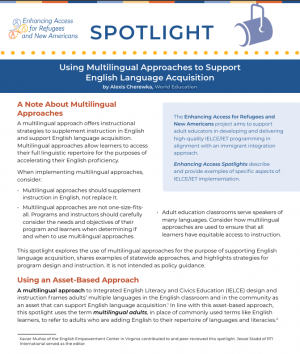Using Multilingual Approaches to Support English Language Acquisition
The document explores the advantages and methodologies of employing multilingual approaches in Integrated English Literacy and Civics Education (IELCE) to aid adult learners in acquiring English proficiency. It emphasizes that these approaches should complement English instruction rather than replace it, catering specifically to the needs and goals of diverse learner populations. Benefits highlighted include cognitive, sociocultural, and economic advantages for immigrants and refugees. Practical strategies discussed encompass translanguaging, community engagement, workforce preparation, and innovative instructional techniques such as allowing learners to guide their language use and integrating translation. Case studies, like those from the English Empowerment Center in Virginia, illustrate effective implementation of these strategies. The document concludes with a call to educators and administrators to adopt and adapt multilingual approaches at state, program, and classroom levels to enhance educational equity and outcomes for multilingual adults.

